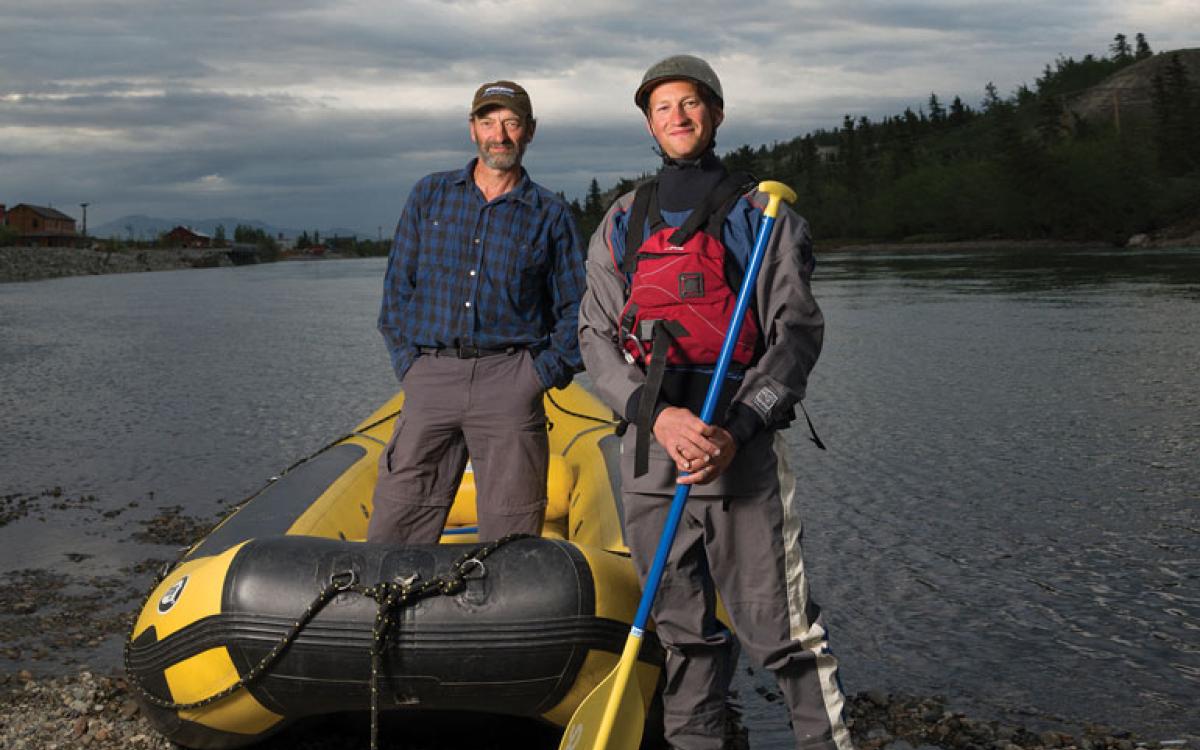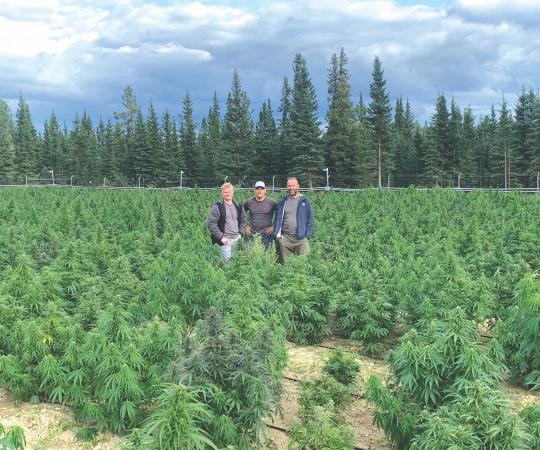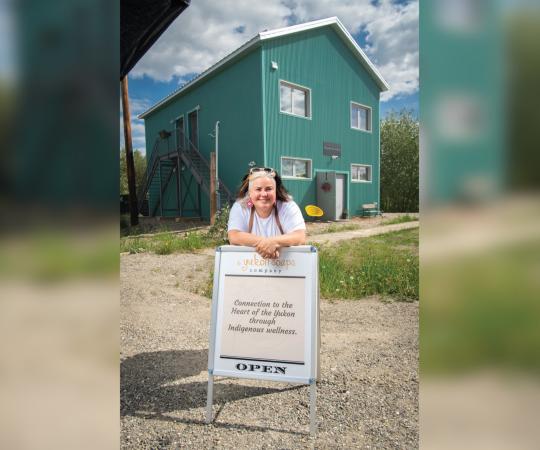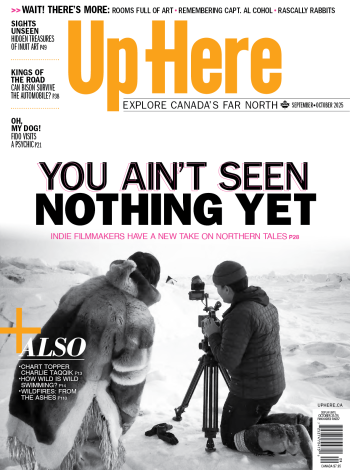Kevin Daffe grew up on the Yukon’s Tatshenshini River. Born in 1981, a year before his father, Bob, officially launched his river rafting and wilderness tourism company Tatshenshini Expediting, Kevin was raised with the business all around him. He remembers a front yard littered with paddling equipment and guides coming and going from his parents’ early home office. He was just eight years old when he kayaked the Tat’s famous whitewater for the first time. So it makes sense that he would wind up managing the family business.
That wasn’t always a sure thing, though. “I definitely ventured off,” Kevin says, sitting at a picnic table in the sunny backyard behind the company’s small downtown Whitehorse office. He tried other jobs, considered joining the RCMP, and studied biology in university. But he always circled back. For obvious reasons: “Man, rafting’s fun,” he says, laughing.
Fun is what drew the elder Daffe to the river, too. Belgian-born, and trained as a mechanic, Bob Daffe arrived in the Yukon in 1969. The business, Bob says, began with “a van, a case of beer, and a raft.” He’d started canoeing when he arrived in the North. “I fell in love with the canoe and then I saw a kayak and tried it and fell in love with the kayak.” By the mid-1970s, he was teaching others how to canoe and kayak on the Yukon’s fast-moving rivers. He had a friend who owned a raft and was looking for an experienced river traveller to guide visitors, so he eventually added rafting to his arsenal, too.
In the early days of the business, Bob did a fair amount of expediting work (logistical support for mining outfits and other companies working in the Yukon backcountry), hence the name, Tatshenshini Expediting. They specialized as they became more established, though, and these days the company is purely about river travel. The Daffes offer multi-day trips, including their signature 10-day Tatshenshini rafting excursion, and they keep busy with whitewater day trips on the Tat and the Tutshi River. (The Tat trip runs seven days a week through the summer.) With a staff of between eight to 12 during rafting season, they also offer vehicle shuttles to independent trippers, rentals of canoes, kayaks and rafts, and, increasingly, river travel training: everything from basic canoeing and kayaking lessons to river rescue courses.
“We work well together and we’re having fun. And we do sit down every year and say, ‘Did you have fun last year?’ ‘Yeah.’ ‘Want to do it again next year?’ ‘Okay.’”
It’s been 11 years since Kevin’s role on the business side of the operation began to increase. The timing was perfect. Bob had been considering selling it all, but a potential buyer didn’t work out. At the same time, Kevin was graduating from university. He was already plenty experienced on the river, but he had to learn the administrative side of things. “So I slowly started getting teaching certificates, got a handle on the base camp operations, and now that I’ve got a handle on that I’ve started moving into more of the paperwork”—taxes, park permitting, that sort of thing. It’s been, Kevin says, a “very gradual process.” Bob now sticks to leading trips and teaching courses. He’s happy to leave the marketing and other nuts and bolts aspects of the operation to his son.
“I’ve always told him that my goal is never to take the company over,” Kevin says. “We work well together and we’re having fun. And we do sit down every year and say, ‘Did you have fun last year?’ ‘Yeah.’ ‘Want to do it again next year?’ ‘Okay.’”
Kevin works as a substitute teacher in the winters. “You’re making ends meet,” he says. “But you’re out on the water every day, or most days [in the summer], so it’s pretty amazing.”
Since taking over the business side, Kevin has made some changes to how the company markets itself. He’s cut back on traditional methods like trade shows and flyers, and instead relies increasingly on social media and photography. He knows his people: they’re adventurers who want a more participatory role in a trip—helping out with rowing the raft or gathering wood in camp or cooking and cleaning—rather than a more full-service, catered trip. Kevin admits that making clear exactly what Tatshenshini Expediting offers, in comparison to some other more luxury-focused commercial Tat trips, can be tricky. To some extent, he relies on past clients to recommend his trips to the right people. Price is an important indicator to potential customers, too. “Right away people ask why [it’s cheaper],” he says. That opens an opportunity to explain.
He’s optimistic about the future of the Yukon’s wilderness tourism industry. In the off-seasons, he and his father have travelled the world in search of multi-day whitewater trips. “Whitewater’s what we love,” he says. But elsewhere, it’s getting harder and harder to find. He rattles off a list of rivers he’s visited that have since been dammed. So long as the Yukon can continue to offer something that people want, and that’s increasingly scarce elsewhere, he figures the people will keep coming, and their numbers will only grow.
That leads, inevitably, to a discussion about the Peel Watershed and the fate of its classic rivers: the Wind, the Hart, the Snake, the Bonnet-Plume. Kevin sees the Peel as an example of the need for a balance between protecting the Yukon’s wilderness and over-regulating it. “I don’t want to see it made a park so I can’t go in there and raft,” he says. “I didn’t want to see it shut down.”
He gives the example of a new requirement, put in this year, for a new type of bear barrel to be carried by rafting trips on the Alsek River, another southern Yukon classic. The cost of the new barrels was too high, says Kevin. “So we’re not running the Alsek this year, is what it comes down to.”
“You need some management, but how much?”
As for Bob Daffe, now that the paperwork is out of his hands he’s philosophical about the changes he’s seen across more than 45 years in the Yukon. Town, he says, has changed. Whitehorse has grown busier, “more sophisticated.” It’s no longer the scruffy frontier capital he arrived in. But “once you’re on the river, the river is the river.”










